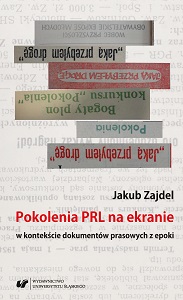Pokolenia PRL na ekranie w kontekście dokumentów prasowych z epoki
Generations of the Polish People’s Republic on the screen in the context of contemporaneous press documents
Author(s): Jakub Zajdel
Subject(s): History, Fine Arts / Performing Arts, Recent History (1900 till today), Post-War period (1950 - 1989), Sociology of Art
Published by: Wydawnictwo Uniwersytetu Śląskiego
Keywords: Polish People’s Republic; media studies
Summary/Abstract: The book aims to describe the complex, multilateral relations among cinematography, propaganda, and the viewers in the times of the Polish People’s Republic. In the second half of the 20th century, after they seized power, the communists launched intensive propaganda activities to create the impression that they enjoyed public support. Among the motifs developed in propaganda texts, there was the generation theme. It involvedthree generation myths, introduced gradually, to which the author refers as the myth of the generation of fight, the myth of the generation of work, and the myth of the generation of duty. They depended for their credibility on information provided by journals and memoirs collected during competitions organised by various newspapers and magazines. The cinema,in turn, was supposed to disseminate them because of its wide range of influence. However, partly for political but mostly for artistic reasons, the filmmakers usually aimed at presenting their own reaction to a generation myth rather than at illustrating it according to the expectations of those who controlled cinematography. Discussing selected fictional films, the author attempts to describe the relation between the myth and its depiction on the screen as perceived by the viewer. Importantly, the author’s intention is to reconstruct the reception of the films upon their first release rather than interpret them according to the standards of the present. Obviously, it is difficult to fully reconstruct the senses that used to provide an important context for the viewers to understand the works discussed. The author strives to accomplish this task by focusing on the senses suggested to the audience by the press, and in particular, by three groups of texts. The first group comprises propaganda texts which verbalised the generation myths. The second group includes generation memoires as published in the press (they were also published in book forms). They served as the foundation for the generation myths by providing necessary details, which were thengeneralised in the myths’ content. The third group comprises film reviews which were supposed to steer the reception of the films. The reference point for the ideological interpretation of the productions they reviewed was the image of generations disseminated by the propaganda of the time. As a result of this discussion, the reader of the book is presented with an outline of some of the complex mechanisms that shaped the cultural memory in the times of the Polish People’s Republic.
Series: Radio, Telewizja, Film, Internet
- E-ISBN-13: 978-83-226-3317-5
- Print-ISBN-13: 978-83-226-3316-8
- Page Count: 326
- Publication Year: 2018
- Language: Polish
- Introduction
- Table of Content
- eBook-PDF

